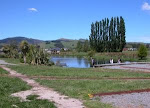As the economist Kate Raworth puts it in this video
discussion , the economy is the way we provision
for our wants and needs and that can be done through:
- Public provision (what local and central governments provide),
- Market exchange (what we buy and sell),
- Household relations, and
- The commons – all the activities that involve communities and resources created and /or held and maintained by those communities for those communities -
This means that we should think not of The Economy
but rather of many different economies that we participate in. Not all economies are purely money based – In
some cases they may be gift based and /or reciprocity based. The way these different economies
collectively provide for our wants and needs varies over time and we are seeing
that clearly now. Household production and public provision are much more important than
they were before lockdown.
We are seeing more focus on household economies. Examples are more people baking rather than
buying bread, people are painting their houses rather than getting someone in
to do it, and an increase in the numbers who are starting to grow veges in the
back yard.
Public provision: Likewise, we are seeing government step in to provide a lot of public resources to provide for the needs of people who find themselves unable to work.
Public provision: Likewise, we are seeing government step in to provide a lot of public resources to provide for the needs of people who find themselves unable to work.
Over the last decades, the market economy has taken over things
that used to be supplied by our commons. For example, we often pay for
babysitters rather than reciprocating with our neighbours. We buy
recreation that clubs once provided, we throw out food or produce when it could
be shared – we buy rather than borrow tools or books which then sit in our
sheds or on our bookshelves unused or unread for months and sometimes years at
a time. It is no longer common to share transport with people.
All this has increased our need for money. However as the market and our just-in-time
systems struggle to deliver what we need, it might be a good time to remember that
a lot of our needs can be taken care of by getting to know and trust people around
us, by working with others to set up local share resources and even to share
work that needs to be done. All this is essentially starting to think
about how to build (or perhaps rebuild) local commons.
Communities around the world have developed a wide range of commons - much wider than the ones we saw in past generations.
For example, we might be able to develop financial commons (such as the Grameen Bank or local savings pools), We could use a Timebanks to ask for
and offer time and skills. We could grow more locally produced food in community
settings, increase access local food growers through local markets, share knowledge and skills, create
recreational opportunities through clubs, share tools and make our local book and food
sharing spaces hum.



No comments:
Post a Comment